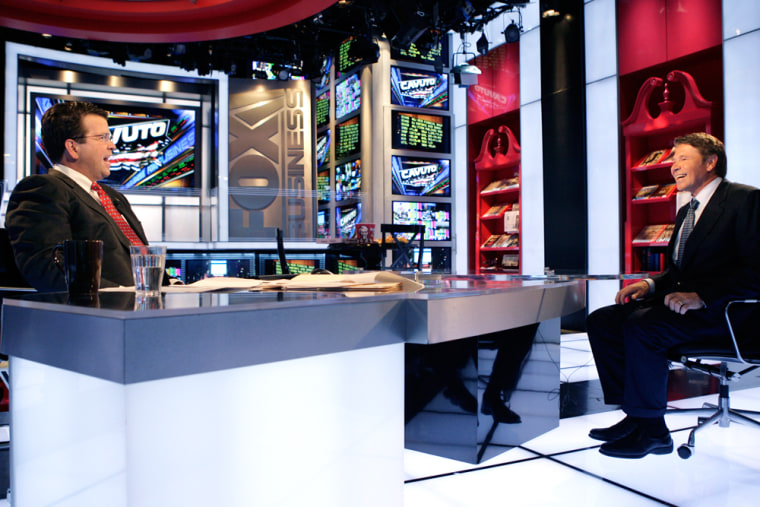Mission accomplished! So far, anyhow.
Fox Business Network, which signed on last week, has swiftly gotten down to business with a wide-angle vision of business as more than just playing the market. It’s also the checkbook in your purse, the price tags in the stores, your dreams of a better job or paying off your plastic.
Just as vital to the mission, Fox Business has made a good start in promoting optimism. On its first morning, a glowing anchorwoman noted that on the same date — October 15 — back in 1951, a TV institution was born: “I Love Lucy.” Good call. Fox’s new institution-in-the-making could aptly be nicknamed “I Love Business.”
This is in shrewd contrast to CNBC, the long-dominant financial network and now Fox’s archrival. At CNBC it’s not about love, but money.
CNBC has always opted for an Alpha Male (or Female) style, a jackets-off, boiler-room image of urgency (even with the jackets on).
On Fox Business, the style is more that of a chummy, overeager Eyewitness News team.
Many from this friendly family already are known to viewers, including Fox News vets Neil Cavuto, David Asman and Dagen McDowell.
There’s also former CNBC star Liz Claman, who last Thursday spent a pleasant hour with folksy uber-investor Warren Buffett in a chat that insistently was touted as newsbreaking.
And there’s NBC’s “Today” alumna Alexis Glick who, on the first day, began with a bang from Times Square interviewing a man who does business as the Naked Cowboy. Accessorized only with boots, hat, tighty-whiteys and guitar, he boasted that by Christmas he expected “over one billion dollars accrued.” Glick gamely tried on his cowboy hat.
Fox Business also has legitimate reports, as well as analysts and numbers. But nothing too intense. It’s easy-listening TV. (Also easy on the eyes: Its women manifest a certain high-gloss look its competition wouldn’t dare.)
At one point, Fox Business co-anchors showcased an inexpensive gadget that lets you use your phone to make free calls through your computer, while, over on CNBC, the topic at hand was: When, and how, do you fire a CEO?
A CNBC anchor pelted a financial expert with wonkish questions about interest rates while Fox Business had a lifestyles-of-the-rich-and-famous interlude with power ties: A fashion expert invited anchor Peter Barnes to swap his red necktie for a blue one that sells for $1,150. Barnes couldn’t resist modeling it.
Monday, both networks had plenty to say about Apple’s huge quarterly profit. But Fox Business couldn’t say enough, with correspondent Jenna Lee even posted outside Apple’s Fifth Avenue store, where she cooed about the product line and interviewed satisfied customers. But why NOT go crazy? Since everybody has an iPod and thinks Apple is cool, viewer interest in the company reaches far beyond people who will ever own its stock.
Bottom line difference between the two networks: CNBC transports you, the ordinary viewer, into the business world, while Fox Business, as it promised from the start, brings the business world to you on your couch somewhere off Main Street.
It also does its best to reassure you that business is good (in all senses of the phrase).
With that in mind, Fox News boss Roger Ailes was baiting the competition months ago. Last February, he told The New York Times he had often seen things on CNBC “where they are not as friendly to corporations and profits as they should be.”
As for Team Fox, he added, “We don’t get up every morning thinking business is bad.”
Probably not. But Ailes has made a policy of acting as if he thinks his business — the news business — is bad enough. Bad, that is, with the notable exception of his staked-out corner of the media universe, where a handful of righteous players (like newborn Fox Business as well as his bruising Fox News Channel) hold forth against what they decry as the liberal media elite.
No less than when Fox News Channel challenged CNN on Oct. 15, 1996, Fox Business reflects a branding strategy straight from the well-thumbed Ailes playbook.
Fox Business spent much of last Friday observing the anniversary of 1987’s “Black Monday” market crash with recaps, analysis and where-were-you-then recollections. The moral of the story, as framed by the network: Things turned out all right, didn’t they?
Thank goodness Fox Business is here now to keep spreading the good word. Most media outlets are all too focused on “biz-blasting,” as Asman termed it during his interview with a guest who duly echoed the Fox Business gospel.
Dan Gainor, director of the Business & Media Institute, came packing research he said proved most media coverage slams the business world. Item: During the market explosion the past few years, the media, instead of “crowing about it,” dwelled on “downbeat news.”
Already a viewer can sense this won’t be a problem on Fox Business. Here the glass of capitalism is apt to be reassuringly half-full, if not overflowing. Free enterprise won’t be blasted by Fox Business, which is busy running interference for it. And encouraging the audience not to get rich, necessarily, but to believe.
